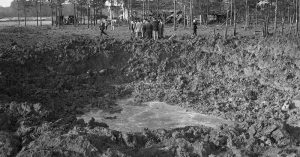March 11, 1958 – An Air Force B-47 bomber accidentally dropped a nuclear weapon on a farm in the rural Mars Bluff community in South Carolina. “The radioactive payload either wasn’t loaded in the warhead or didn’t detonate — the stories differ.


But the TNT trigger for the bomb blew a crater in Walter Gregg’s garden some 24 feet deep and 50 feet wide. The blast shredded his farmhouse about 100 yards away.”
The atomic warhead would have been 30 kilotons — twice as powerful as the bomb that devastated Hiroshima in World War II. Florence, five miles away, would have been obliterated. Most of the rest of the 30,000 residents of Florence County would have been wiped out or sickened by radiation.”
No one wants “to think of trained crews bobbling atomic bombs. But the Mars Bluff incident is one of about a dozen unplanned drops that took place in the 1950s before the military decided not to carry nuclear warheads on training runs.
They called the lost bombs “broken arrows.”
The era was the dawn of the Cold War when atomic bombs were still as incomprehensible as they were horrifying. The threat was immediate. There was no real defense. Schoolchildren ran through drills where they hid under their desks — “duck and cover” — in case of an attack.
Just a month before the Mars Bluff incident, a bomber dropped a hydrogen bomb somewhere off Tybee Island, GA, after colliding with a fighter jet during training. A nuclear explosion from it would have been 100 times more powerful than Hiroshima.
That bomb has lain buried deep somewhere in the ocean-bottom muck for more than a half-century.
Typically during training runs the bombs carried uranium but not the capsule needed to detonate it, although in congressional testimony in 1966 the acting secretary of defense said four of the missing bombs did carry the capsule, including the Tybee bomb, according to a later CBS News report.
The testimony itself was later recanted — just one indication of how secretively the military dealt with mishaps.”
“The story told in Mars Bluff is that the bomb was launched inadvertently, bumped loose from a B-47 when the plane hit an air pocket as a crew member leaned over the launch trigger to check it.
The military never officially said. Its spokespeople insisted early and often the bomb wasn’t armed and there was no danger of nuclear detonation.
But one of the pilots made a distress call saying they had jettisoned “hot cargo,” or an atomic bomb. The three pilots, said to be on a training mission out of Savannah and cruising at 15,000 feet, were re-assigned overseas for seven years. When they came back, they went to see Walter Gregg.” Helen [Gregg] Holladay, a daughter recalled that “They told my daddy everything was aboard,” Holladay said. “It was a totally different story than what the government put out.”
“For the next 25 years, she said, military craft flew overhead the farm checking for radiation.
No one died or was seriously injured in the Mars Bluff blast. But the Gregg family came away with little more than the clothes on their backs.
Walter Gregg eventually sued and was awarded $36,000, according to the exhibit at the Florence County Museum. That wasn’t enough to rebuild the house, much less replace the possessions lost or stolen in the aftermath, Holladay said. “My daddy resented it all his life.”
One smile-inducing postscript to the story: The Greggs later appeared on the television show “I’ve Got a Secret” and stumped the panel trying to guess what the secret was.
In 2008, making an effort to recognize the event, county historians erected the markers at the site and held a commemoration ceremony attended by about 100 people.
“It’s not many towns that can say they had an atomic bomb drop and nothing (deadly) happened,” said Marshall Yarborough, the Florence County Historical Commission chairwoman.”
Information from: The Post and Courier, http://www.postandcourier.com
Source: Military Times, The atomic bomb that faded into South Carolina history
